- Environmental
Policy - Environmental Management System
- Responses to
Climate Change - Efforts to Reduce Environmental Impact
Environmental Policy
As a highly respected industry partner, the DJK Group’s goal is to contribute to the development of a highly innovative global society.
In accordance with its basic philosophy and policy on sustainability, the DJK Group will contribute to a sustainable, enriched world.
To accomplish our corporate philosophy, “Connecting People, Connecting Technology and Enriching the World,” we are committed to resolving customers’ environmental issues through our business activities by capitalizing on our engineering functions. The DJK Group aspires to always be a valued partner for its stakeholders.
- We operate an environmental management system (EMS) established based on the environmental policy and strive to continuously improve it.
- We handle products that help protect and improve the global environment and contribute to the mitigation of climate change through our business activities.
- We recognize the importance of biodiversity, as well as the importance of forests, water, and other limited resources, and strive to reflect this recognition in our business activities.
- We comply with applicable environmental laws, regulations, and accords in Japan and internationally in conducting business activities.
- We provide continuous education to help all directors, executive officers, and employees of the DJK Group deepen their understanding and awareness of environmental management.
Environmental Management System/ISO14001
System for Promoting the Environmental Management System
Since January 2004, we have operated an environmental management system (EMS) based on ISO14001 to systematically promote the reduction of environmental impact.
We have designated the Representative Director, President & CEO as the top management and Executive Officer, General Manager of Administration Division as the person in charge of environmental management. Based on our environmental policy, the EMS Promotion Committee plays a central role in implementing the PDCA cycle and making continuous improvements. Through this system, we are accelerating our initiatives to address climate change in terms of both risks and opportunities.
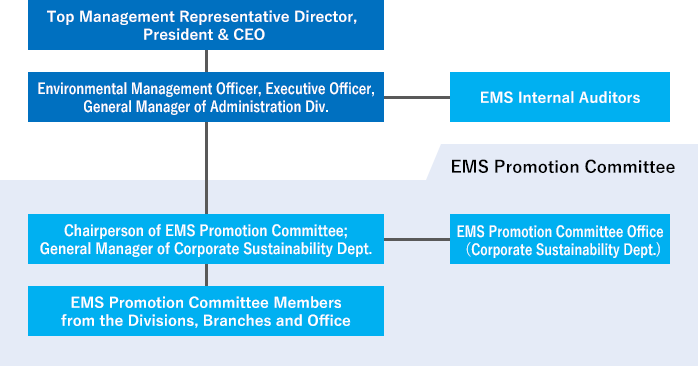
Acquired ISO14001 Certification
We have acquired certification for ISO14001, an international standard for environmental management.
Responses to Climate Change
Endorsement of TCFD Recommendations
In August 2022, we declared our support for the Final Report: Recommendations of the Task Force on Climate-related Financial Disclosures. Taking the opportunity of this declaration of support, we will analyze and study the risks and opportunities to our business posed by climate change and progressively disclose information in line with the TCFD recommendations.
Governance
Since January 2004, we have operated an environmental management system (EMS) based on ISO14001 to systematically promote the reduction of environmental impact. We have designated the Representative Director, President & CEO as the top management and Executive Officer, General Manager of the Administration Division as the person in charge of environmental management. Based on our environmental policy, we are making continuous improvements using the PDCA cycle. Through this system, we are accelerating our initiatives to address climate change in terms of both risks and opportunities.
Strategy
In 2022, we declared our support for the final report (TCFD recommendations) of the Task Force on Climaterelated Financial Disclosures (TCFD). In FY2023, using the Company’s Plant & Energy Business (segment), which is one of our seven business portfolios and which is relatively susceptible to the financial impacts of climate change due to its high volume of business in the resource, oil refining, and chemical fields, we identified the risks and opportunities that climate change will have on our business activities, and conducted a scenario analysis. The overview of this is as follows.

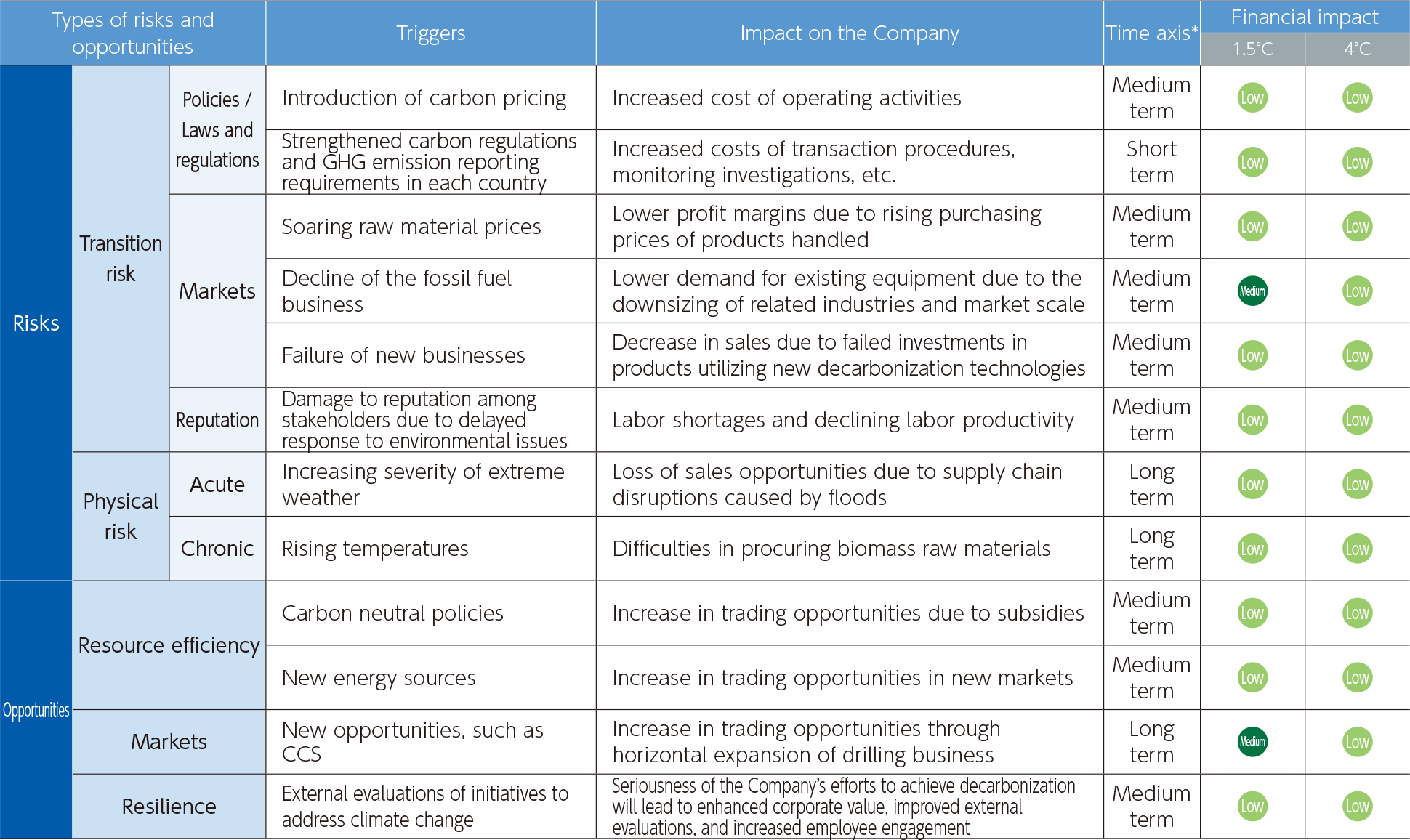
*Short term: within 3 years, medium term: within 4-9 years, long term: 10 years or longer
Metrics and targets
At DJK, we target carbon neutrality, with net zero greenhouse gas (GHG) emissions by FY2050, taking FY2020 as our reference year. By FY2030, we aim to reduce GHG emissions by 46% compared to FY2020. We will work toward achieving these targets, reducing Scope 1 emissions by replacing our gasoline-fueled business vehicles with hybrid vehicles, as well as considering the introduction of EVs, and reducing Scope 2 emissions through initiatives such as switching to electric power from renewable energy and introducing energy-saving equipment.
This fiscal year, we also calculated emissions associated with the Group’s employee business travel and commuting, as well as emissions associated with the Group’s capital goods, as part of efforts to expand the scope of our greenhouse gas emissions measurement.
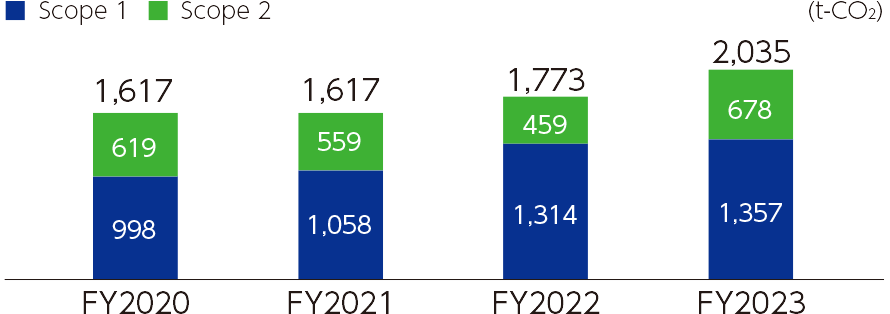

*NB
- Scope 2 is calculated based on market standards.
- DJK and its consolidated subsidiaries in Japan and overseas have been included in the calculation of emissions, but small bases with a limited effect on overall emissions have been excluded.
CDP Score
DJK has received a “C” rating in the CDP Climate Change Report 2023.
- Category
- Climate Change
- Score
- C
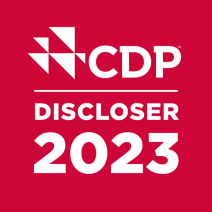
*NB
CDP is a not-for-profit international organization based in England.
CDP conducts initiatives urging corporations and municipalities to address environmental issues such as climate change, water resource conservation, and forest preservation, in response to requests from environmentally conscious investors worldwide.
Efforts to Reduce Environmental Impact
Promoting Wider Use of Eco-friendly Products
Among all the types of industrial machinery we handle, we are strengthening our efforts to expand sales of products that contribute to resource recycling, resource conservation, and reduction of workload and workforce in our customers’ product manufacturing. The variety of environmentally friendly products has been increasing year by year, and in recent years, many of them have become useful for social infrastructure. The Group considers the provision of products and services to be a contribution to society through business, and will continue to expand the range of products it handles, recognizing that environmental friendliness is the most important issue in business.
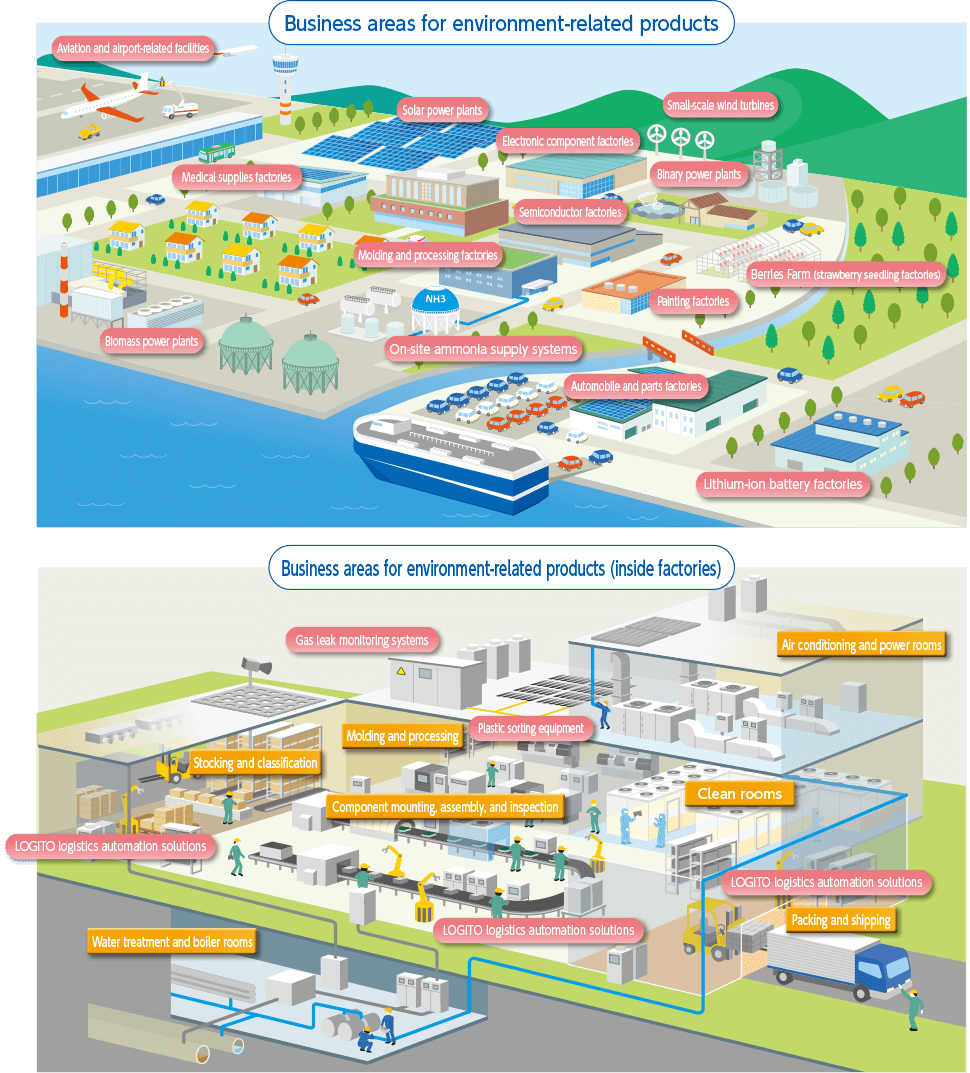
Initiatives to improve plant security
At DJK, we are working to establish smart factories and security to address social issues such as aging plant facilities and labor shortages. As part of this effort, we have dealt in gas leak monitoring systems manufactured by Konica Minolta, Inc. to support “regular monitoring of abnormal occurrences without human intervention,” and “prompt and appropriate maintenance work even by non-experienced maintenance personnel.”
Safety countermeasures against gas leaks are important, as such leaks can cause fires and explosions. Compared with conventional gas detectors, use of cameras makes it easy to identify the source of leaks and determine any abnormalities, even in elevated locations. It also enables the visualization of pools and pockets of gas from volatile solvents, contributing to the improvement of work environments and the prevention of accidents. In addition to plant equipment, we will promote the camera’s utilization for fuel depots, tankers, and various manufacturing sites, and will also contribute to reducing environmental impact by monitoring the diffusion of greenhouse gases.
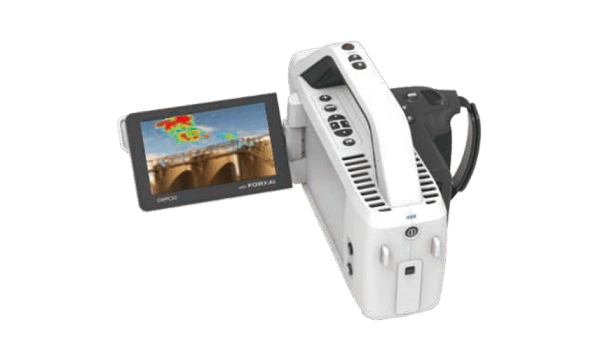
Contributions to Sustainable Industrial Development through LOGITO
With the aim of solving the problem of population and labor decline in the manufacturing industry, we have been developing the LOGITO brand and providing logistics automation solutions to realize automation and workforce reduction in production sites, factories, and logistics warehouses.
Engineers with a wealth of field experience select the optimum equipment from among various manufacturers all over the world and propose custom designs to realize high cost performance. We provide one-stop solutions, from factory analysis to layout proposals, equipment selection, construction, and after-sales service.
By promoting workforce reduction and labor saving at production sites, factories, and so forth, we will contribute to the sustainable development of industry in various aspects, including productivity, efficiency, and consideration for the environment.
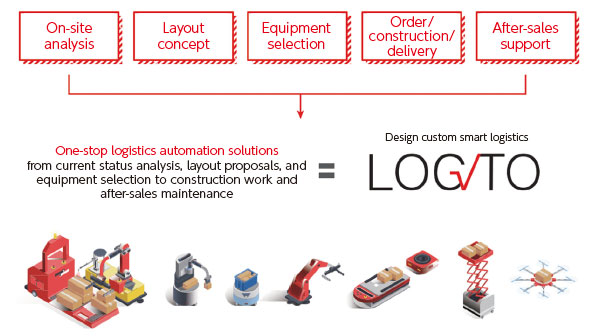
LOGITO SMT, promoting peripheral automation of mounting lines
Under the brand name LOGITO, we provide logistics automation solutions to achieve automatic operations and labor savings at manufacturing sites, factories, and logistics warehouses, aiming to resolve the issue of the decline in the working population for manufacturing. Leveraging the know-how of LOGITO, we launched a new brand called LOGITO SMT in February 2024 to realize peripheral automation of the SMT line in the mounting industry that we have built so far. We propose automation and labor savings for the storage and incoming and outgoing operations of materials, the transportation of parts from storage sites to mounting lines, and the transportation of magazines carrying substrates mounted for the next process.
LOGITO and LOGITO SMT will contribute to the development of industry in numerous ways such as improving productivity, efficiency, quality, labor welfare, and eco-friendliness, by promoting workforce and workload reductions at manufacturing sites, factories, and other facilities.
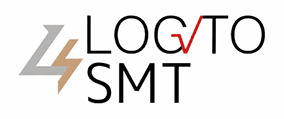
Joint Crediting Mechanism (JCM) Business
This is a mechanism used in order to quantitatively evaluate contributions of Japan to greenhouse gas emission reductions and removals which are achieved through the diffusion of, among others, leading decarbonizing technologies as well as through the implementation of measures in developing countries and others, and in order to use such contributions to achieve Japan’s nationally determined contribution (NDC).
Adopted Projects
FY2018
Project: Introduction of a biomass boiler in a chemical plant
Expected GHG* reduction: 16,882t-CO2 per year
FY2021
Project: Total 28MW solar power generation project utilizing the PMGD Scheme*
* PMGD Scheme: A framework in Chile to support small-scale distributed power generation projects
Partner country: Chile
Expected GHG* reduction: 21,240t-CO2 per year
*: Greenhouse gas
Other Environmental Initiatives
For company vehicles used in Japan, the ratio of environmentally friendly vehicles, including hybrid vehicles, is over 90%.
In addition, in the office environment, we are promoting paperless meetings, and using web conferencing systems to reduce greenhouse gas emissions from business trips.
We are working to expand green procurement by prioritizing the use of Eco Mark certified and recyclable products for office consumables and environmentally friendly inks and paper materials for booklets and other publications.
We believe that the accumulation of such steady efforts can also contribute to environmental conservation, and we will continue to promote internal efforts to reduce the burden on the environment.





